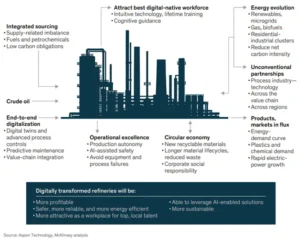Considering the market conditions that we have today, Oil, Gas & Energy (OGE) enterprises must be adaptable to the shifting demand of the market. Looking into the upcoming business models like non-fossil fuels and EV charging networks, there’s a lot that modern-day companies need to brace up for, especially around measuring and reporting carbon footprints.

Source: https://blogs.sap.com/
Apart from that, organizations also need to emphasize worker safety, efficiency, and sustainable operations to boost staff productivity to enable all of the following; digital technologies play a crucial role. The Industrial Internet of Things (IIoT) data, along with recent technological advancements in computing power and connectivity.
Today, all such functionalities are incorporated into the OGE Intelligent refineries and factories to improve performance and make well-informed operational decisions based on AI, data analytics, and other first-principles models.
Intelligent factories give OGE industries the possibility to:
- Monitor leaks from vapor recovery systems, venting activities, and oil tank batteries to reduce emissions.
- Real-time good improvements may be calculated to optimize drill rig operations.
- Equipment problems can be anticipated and prevented.
- Less human involvement for increased safety thanks to “Always On” linked systems.
- With enhanced field service, the correct components will be available for the right person at the right time.
Sounds interesting right? Continue reading as we explore the different aspects in which AI and IoT could be shaping the future of the OGE industries in our latest blog.
Intelligent Factories: What Are They?
An OGE company’s Intelligent Production is connected to several sources, including shop floor systems, machinery, and supply chain systems, to provide customers with improved insights into your factory as they sit in their offices. Therefore, the manual chore, paperwork, incidents, and data clarity are what consumers get rid of. And as a consequence, they are learning more about a refinery, its products, its business performance, equipment, margins, and workers, among other things.
The intelligent factory is one of the main components of Industry 4.0, which SAP considers the future’s productivity wave. Customers will build great experiences that encourage repeat business by connecting all the essential components of their business to suppliers in this way. Your intelligent enterprise is connected to every link in your supply chain. The following digital platforms are used by OGE’s intelligent factories, which operate within the framework of Industry 4.0, to achieve notable gains in quality, flexibility, productivity, and service.
Now that we know what intelligent factories are let’s understand the concepts that make them unique.
Different Aspects of Intelligent Industries
Cloud Connectivity
Whether private, hybrid, or public, the cloud is the conduit for all data and information traveling throughout a smart factory. Global and enterprise-wide cloud connectivity ensures that real-time data is available in all areas of the organization and that the whole supply chain is immediately visible.
Here are some added benefits of the connectivity:
- Secure, safe, and accessible are reliable: Access the cloud system around-the-clock from anywhere with fast response times. Run by a team of full-time security professionals on safe servers. Recognize that your data is redundant and backed up offsite.
- Flexible: Receive the computer power you require when you require it. Increase or decrease server capacity, networking, or storage. Bring on new users right away. Add additional geographical areas. Finished quickly and easily.
- Financial: Pay only what you need. There are no upfront costs for equipment or facilities. Reduce the time spent on system maintenance and upgrades by IT professionals. Instead, put your money and resources into things that will bring you money.
Artificial Intelligence
The power, flexibility, and speed of operational systems that use AI technology enable them to collect and analyze various data sets and deliver timely insights and actionable suggestions. As a result, artificial intelligence constantly improves and informs automated procedures and intelligent systems in a smart factory.

Source: https://blogs.sap.com/
Data analysis is now more efficient than ever because of big data, analytical tools, and artificial intelligence (AI). The more advanced data insights that arise help improve asset maintenance, find better places to drill, reduce unscheduled downtime, and maximize output. Consequently, data science and AI assist oil and gas companies in becoming more operationally efficient.
Machine Learning
The ability of machine learning to do sophisticated predictive maintenance is one of the most important advantages it delivers to the Intelligent factory. Ahead of a system breakdown, alarms can be given by tracking and analyzing production processes. Automated maintenance may be performed in some circumstances, or if it’s essential, human involvement may be advised.
Diverse machine learning models that employ different algorithmic strategies make up machine learning. In essence, machine learning algorithms are made to categorize objects, look for patterns, forecast results, and make conclusions. Furthermore, when dealing with complicated and unexpected data, algorithms can be utilized alone or in combination to obtain the highest level of accuracy.
By connecting IoT-enabled corporate assets, running advanced analytics on the real-time data they produce, and utilizing the resulting insights to guide intelligent, economical, and effective maintenance methods, predictive maintenance aims to minimize equipment failure and downtime.
Industrial Internet of Things (IIoT)
When equipment and machinery in an intelligent factory are equipped with distinctive IDs and the capacity to transmit and receive digital data, they form an IIoT network. As a result, even decades-old analog equipment may be upgraded using IIoT gateway devices that would optimize and pace up the speed of operations. In addition, while modern machinery already has access to digital gateways, allowing them to initiate device automation and control its actions and workflows, data from the device reports its condition and activities.
The Oil, Gas, and Energy industries are changing how they conduct business thanks to the Industrial Internet of Things or IIoT. For example, businesses may gain from automated monitoring and diagnostics by connecting equipment and field assets to an IIoT platform with smart sensors. As a result, they may develop real-time insights, operations, and procedures that help improve planning for equipment maintenance and use.
Additionally, the IIoT may aid businesses in enhancing environmental compliance, quality assurance, and safety. As the IIoT develops further, it will offer businesses even more chances to boost productivity and cut expenses.
Blockchain
Fortunately, security solutions are developing at the same rate as Intelligent Factory technology. From establishing “smart contracts” with suppliers to monitoring the provenance of items and handling throughout the supply chain trip, blockchain has various uses in the supply chain.
Blockchain is particularly helpful in intelligent factories to control access to linked equipment and assets within the organization, safeguarding the system’s security and the veracity of such devices’ data.
Smart Operations are the Future
Companies are making considerable investments in automation technology over the next years because the gradual implementation of automation provides significant extra commercial possibilities for the OGE industry.
Does your organization leverage future possibilities?
